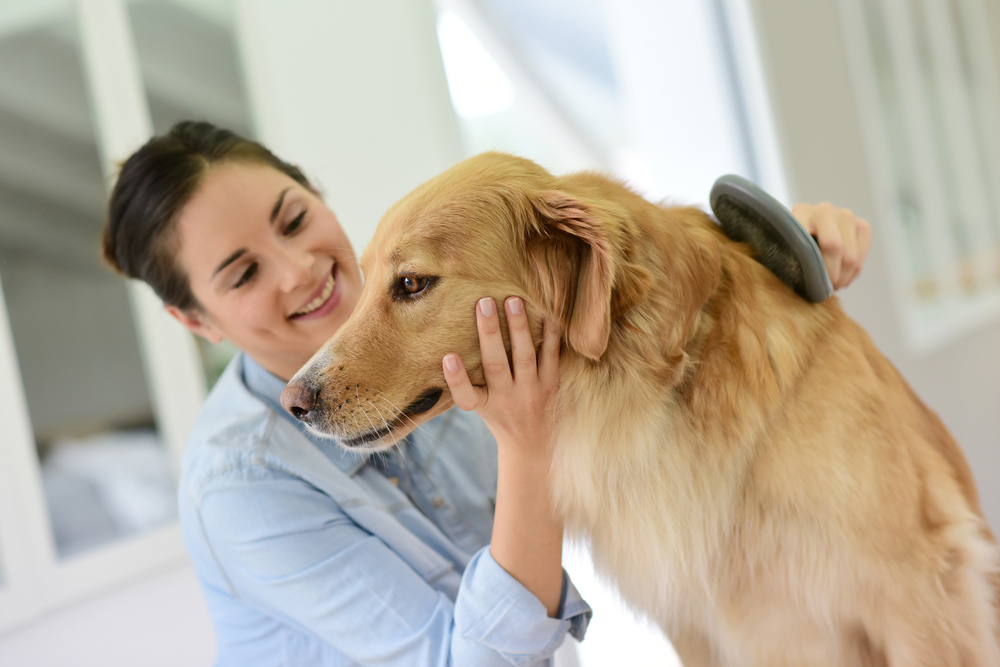As dog owners, we have a lot to deal with. Our dog’s nutrition, training, and enrichment are already full-time commitments – not to mention dealing with all the fur they shed. However, that’s not the only thing that dogs shed, as many of them also have dandruff.
Dog dandruff is a common concern among pet owners. While it might seem like a minor issue, dandruff can be a sign of underlying health problems or inadequate care, affecting your dog’s well-being and quality of life. Take heart, because there are a number of effective strategies to manage this condition.
Understanding Dog Dandruff
Dog dandruff, medically known as seborrhea, can be categorised into two types: seborrhea sicca, resulting in dry, flaky skin, and seborrhea oleosa, which involves oily skin and flakes (often seen in breeds like Cocker Spaniels, Basset Hounds, and Dachshunds). It’s a symptom rather than a disease itself, indicating dry skin, allergies, nutritional deficiencies, or more serious skin conditions.
Causes of dog dandruff include genetic predispositions, environmental factors, diet, parasites (like mites or fleas), fungal or bacterial infections, and underlying health issues such as thyroid problems or immune disorders. Understanding these causes is crucial for effective prevention and treatment.
Signs and Symptoms of Dog Dandruff
Identifying dandruff in dogs involves more than spotting white flakes; it requires observing their behaviour and skin condition. Symptoms include excessive scratching, dry or oily skin, a dull coat, and visible white or yellow flakes. Early detection is key to preventing discomfort and more severe skin issues.
Preventive Measures
Preventing dog dandruff starts with regular grooming. Brushing your dog’s coat not only removes dead skin and hair but also stimulates oil production, which helps keep the skin healthy. Bathing your dog with the right frequency and using moisturising or medicated shampoos can maintain skin hydration and health.
Diet plays a significant role in skin health. Ensure your dog’s diet is balanced, rich in essential fatty acids (like omega-3 and omega-6), which are vital for maintaining healthy skin and coat. Supplements can also be beneficial, but consult with a veterinarian for tailored advice.
Lifestyle changes, such as maintaining a stable, stress-free environment, can also impact your dog’s skin health. Regular exercise and avoiding sudden changes in diet or routine help prevent stress-induced dandruff.
Treatment Options
For mild cases of dandruff, over-the-counter medicated shampoos designed for dogs can be effective. Look for products containing ingredients like oatmeal, aloe vera, or tea tree oil, which soothe and moisturise the skin. However, it’s important to use these products as directed and not over-bathe your dog, as this can dry out their skin further.
Home remedies, such as rinsing your dog with a solution of apple cider vinegar and water (in a 1:1 ratio), can provide relief and act as a natural antifungal treatment. However, these should be used with caution and only after consulting with a veterinarian to ensure they’re safe for your dog’s specific condition.
In more severe cases, or if your dog’s dandruff persists despite home care, consulting a veterinarian is crucial. They can diagnose underlying conditions, prescribe medicated shampoos, oral medications, or supplements, and provide tailored advice for your dog’s needs.
Regular Care and Monitoring
Consistent care is key to managing dog dandruff. Regular baths with the appropriate shampoo, consistent grooming, and monitoring your dog’s skin and coat health can prevent flare-ups. Pay attention to changes in your dog’s skin, coat, or behaviour, and consult with a veterinarian if you notice anything unusual.
Conclusion
Dog dandruff is a manageable condition with the right care and attention. By understanding its causes, recognizing the signs, and implementing preventive measures and appropriate treatments, you can ensure your dog remains comfortable and healthy. You can tackle dandruff effectively with just a little bit of effort, ensuring your furry friend enjoys a happy, healthy life.







